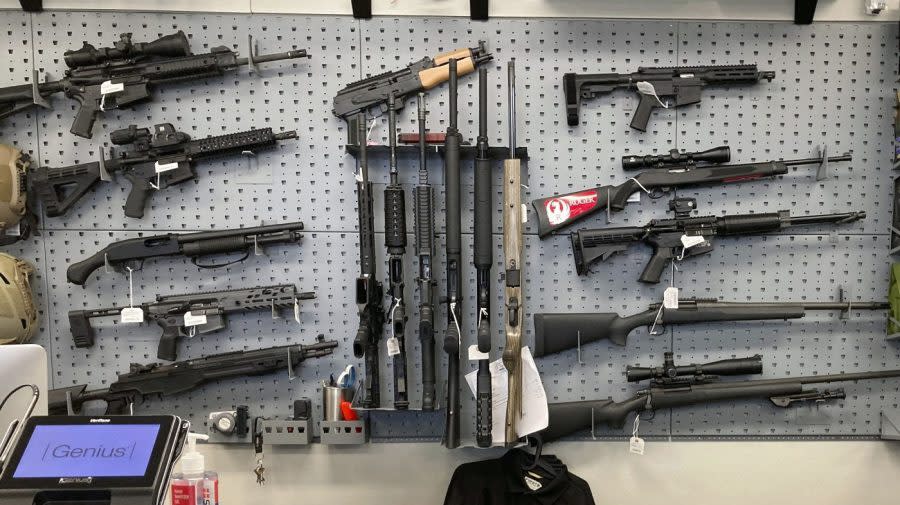Gun control groups call on Congress to undo background check change for veterans

Congress has created an “enormous threat to the safety and well-being of veterans” by blocking Department of Veterans Affairs (VA) reports of mental incompetency from entering the federal background check system, gun reform groups said in a letter to lawmakers this week.
The provision in question was part of the $1.2 trillion budget bill passed by the House and Senate last month. Originally introduced as a separate bill by Sen. John Kennedy (R-La.), the measure is meant to limit the ability of the VA to stop veterans from purchasing guns.
The Brady United Against Gun Violence, Everytown for Gun Safety, Giffords, March for Our Lives and 45 other gun reform groups wrote to lead appropriators in the House and Senate on Tuesday urging them to drop the provision — Section 413 — in their next appropriations bill.
“Limiting access to guns for veterans and other VA beneficiaries who may be in crisis by reporting them to the background check system is a critical step to help keep them safe,” the groups wrote in the letter.
“This provision is incredibly harmful: Section 413 is an enormous threat to the safety
and well-being of veterans and their beneficiaries who are at a heightened risk of harm to
themselves or others; it undermines the Department of Veterans Affairs’ (VA’s) ability to prevent
these individuals from accessing firearms; and it weakens the background check system, one of
the most important tools we have to prevent gun violence.”
According to press releases from Kennedy’s office, his amendment is intended prevent “Veterans Affairs bureaucrats” from reporting “whenever a fiduciary is appointed to help that veteran manage his or her VA benefits” to the National Instant Criminal Background Check System (NICS).
However, the Brady Center said the appointment of a fiduciary was part of a larger process meant to protect veterans facing a mental health crisis.
“As far as I can tell, Sen. Kennedy believes that the appointment of a fiduciary is what puts people into the NICS system, and Congress was led to believe the same,” Mark Collins, director of federal policy at Brady, said in a phone interview.
“The step that ends up making a veteran prohibited [from owning a firearm] happens before that. Assignment of a fiduciary is the consequence of being found mentally incompetent by the VA,” he said.
“This isn’t someone just stepping in to help a veteran handle their benefits or finances,” he added.
The gun reform groups wrote that Congress has created, perhaps unintentionally, a “very dangerous” situation, especially for a veteran population “disproportionately impacted by the suicide crisis.”
The groups said the law effectively sets a trap for these vulnerable veterans by allowing them to pass a background check, but still being prohibited from owning a gun due to the VA ruling of their mental incompetence.
“We’re allowing veterans who are prohibited from possessing a weapon by law to buy guns,” Collins said.
“If for some reason they were to encounter law enforcement, they could be found in unlawful possession of a firearm and charged,” he added.
Under the Bipartisan Safer Communities Act of 2022, the maximum penalty for unlawful possession of a firearm rose from 10 years to 15 years in prison.
The groups point out that veterans face a particularly severe suicide crisis, with more than 6,500 veterans dying by suicide each year — 70 percent involving firearms, compared to 48 percent of suicides among the general population.
The Hill has reached out to the offices of Kennedy as well as the appropriators who received the letter — Sens. Patty Murray (D-Wash.) and Susan Collins (R-Maine); and Reps. Tom Cole (R-Okla.) and Rosa DeLauro (D-Conn.) — for comment.
In a statement to The Hill, VA press secretary Terrence Hayes confirmed the department has ceased reporting to NICS.
“VA previously reported to NICS in situations when the Veterans Benefits Administration determined – based on clear and convincing evidence or a court order – that a VA beneficiary was unable to manage their financial affairs,” Hayes said.
“The Consolidated Appropriations Act of 2024 now restricts VA from using appropriated funds to report a beneficiary unless there is an order or finding from a judicial authority that the beneficiary is a danger to themselves or others.”
For the latest news, weather, sports, and streaming video, head to The Hill.

 Yahoo News
Yahoo News 
